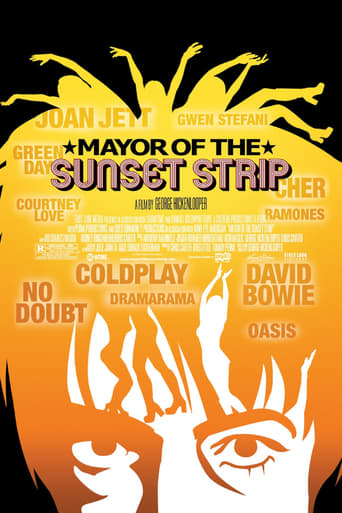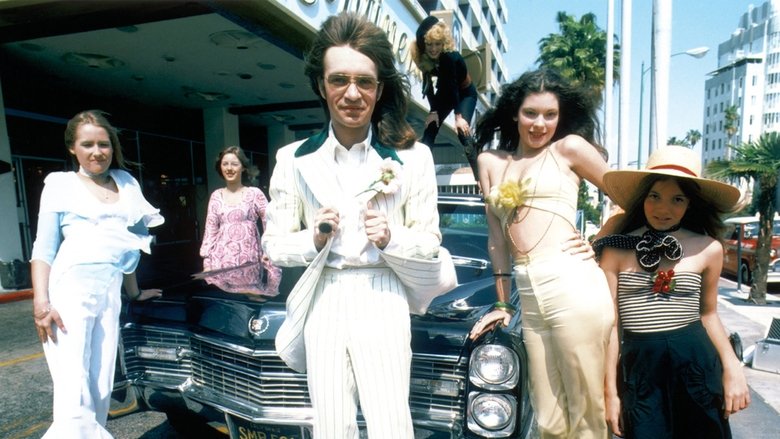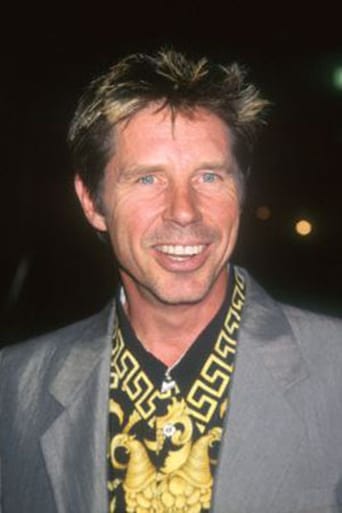Mayor of the Sunset Strip (2003)
A look at the history of fame in the world through the eyes of pop star impresario, Rodney Bingenheimer
Watch Trailer
Cast
Reviews
Overrated
Just what I expected
Great Film overall
The biggest problem with this movie is it’s a little better than you think it might be, which somehow makes it worse. As in, it takes itself a bit too seriously, which makes most of the movie feel kind of dull.
Argh once again I'm the victim of a marketing scheme which ruined my enjoyment of this otherwise good film. You've probably noticed the first words on the DVD box in bold letters are: "THE GREATEST ROCK'N'ROLL FILM OF ALL TIME!" On the back another hyperbolic film critic raves "THE GREATEST ROCK'N'ROLL FILM EVER MADE!" And then it goes on to list "featuring music and appearances by..." and name-drops every famous act since 1965, even daring to play the Beatles card.DON'T. YOU. BELIEVE. IT.While Mayor of the Sunset Strip is an interesting, nostalgic trip to California's music scene in the last quarter of the 20th century, it's a far cry from "the greatest rock'n'roll film ever" or even any sort of rock'n'roll film. It lacks the music to make it a true rock'n'roll film.The focus is not on music but rather on the phenomenon of pop celebrity. Often the "music and appearances by..." are only 0.5 second clips of some celebrity shaking hands with Rodney. Some are just photographs.The bulk of the celebrity interviews are: Kim Fowley for 10-15 mins total, Nancy Sinatra for maybe 5 mins, Joan Jett for maybe 1 min, Cher 1 mins, Bowie 45 sec, Gwen Stefani 30 sec (but parts repeated to make it longer), Ray Manzarek 15 sec, and a few others for 15 sec or less. Tori Amos appears through the door of her trailer looking confused for exactly 1.5 seconds, and the Beatles "appearances" are just photos and stock footage.Marketing for this film is deceptive at best, dishonest at worst. If this sort of thing pisses you off as much as it does me, pumping your expectations to unrealistic heights then dropping you on your butt unfulfilled, then you may want to put down the ritzy DVD box, take a deep breath, remind yourself that it's just a mid-budget documentary, and enjoy it for what it's worth, not what it promises to be.Now about the movie itself. It suffers from a bit of identity crisis, at times trying to prove that Rodney is an icon whom we should adore, at times portraying him as a loser who never got his due. He is shown as a short, gentle, harmless man, but then we are shown images of him licking topless women and stories of him having sex with every groupie who ever hitched a ride to California. We are shown images of a shabby-looking home with holes in the furniture, but then it's made clear that he was the successful owner of a downtown nightclub where patrons and girls by the dozen would kill to get into his VIP room. I'm not sure what the filmmaker was trying to do. But the result was that I didn't feel any sympathy for Rodney by the end of the film, because it's obvious that he had more wine, women & song in 1 day than most of us have in our miserable lives. Is the director's point that he didn't get enough??Rodney himself has a cute boyish face which makes him instantly lovable, but his awkward, 1-word answers to the director's questions become slightly irritating by the end of the film. I certainly don't fault Rodney for playing his cards close to his chest; he strikes me as a very private man with serious reservations about having his life splayed out on a buffet table. I fault the filmmakers for not coaxing the good stuff out of him. And I'm not talking about dirt & drama, I'm talking about the simple passion for music that drove Rodney. Would it have killed the filmmakers to spend 5 minutes asking him what his favorite song or band or style was? No, instead it always seems to be "who's the most famous person you met?"Well, lack of music notwithstanding, this is an interesting documentary about an underdog. It doesn't really tell a story, not like the excellent "Anvil! The Story of Anvil" (now THAT ONE can indeed be called the greatest rock'n'roll film ever). In Mayor of the Sunset Strip I feel as though the filmmakers failed to deliver. That plus the absurdly inflated expectations I had from the DVD box made this a ho-hum experience.If you're truly interested in discovering "the greatest rock'n'roll film ever", please check out the aforementioned "Anvil" (even if you're not a metal fan, it's charmingly honest). Also check out the classic satires "This Is Spinal Tap", "Still Crazy", "The Ruttles: All You Need Is Cash", the brilliant documentary "Searching for Sugar Man", and if you can stand a little 80s cheeze there is tremendous poetry in "Eddie & the Cruisers". When I consider all these terrific rock'n'roll films through the decades, there is no doubt in my mind that Mayor just isn't in the same class. As long as you don't expect it to be, you'll have a good time.
Question: "Do you wish your life could have been different?" Mayor Rodney's Answer: "Mmmm, yeah actually "Formerly Groovy Rodney Bingenheimer (born in 1946) is now an ugly little man with a hollow, monotone voice, bangs, tight pants and pointed "Beatle Boots"lost in the 21st century. He adored his domineering Northern California waitress mother, Marion Bingenheimer, who dumped his father when he was three and consequently dumped him on the doorstep of Connie Stevens when he was 17. "I didn't see my mom for about five or six years."Anyway, Ms. Stevens wasn't home and suddenly homeless Rodney, trudged his way up to the Sunset Strip, beginning his hand to mouth existence mingling with, and riding the coattails of, up and coming pop music stars. The denizens of the music scene seemed to accept him mainly because he was such a harmless little guy. Kind of a penniless West Coast version of Andy Warhol."Rodney buys into the rock star myth, and derives a sense of gratitude and fulfillment from that energy."Soon, he was a body double for Davy Jones of the Monkeys. He also chummed around with Sonny and Cher whom he considered to be his substitute dad and mom. He had arrived in the giddy world of backstage passes and willing groupies.The halcyon sixties soon drew to a close and Rodney began his slow drift into obscurity. The one thing he remained very good at, was proclaiming which rock 'n roll groups would become popular But he never seemed to made any money (at least no money to speak of) off of those predictions.Rodney currently lives in a shabby aging apartment off of Sunset, filled with pop memorabilia, which he refers to, somewhat facetiously as "Bingenheimer Manor". Mother Marion is dead; his current obsession, Camille considers him only as a "friend". Pushing 60, he's never been married; with a pop career consisting of an after midnight, three-hour once a week, DJ gig."Mayor" Bingenheimer has become a walking cautionary tale for those of us born in 1940s Boss Angeles, as well as those overly obsessed with celebrities.
If "Mayor of the Sunset Strip" were not a documentary, no one would ever believe the story it tells. The film chronicles the life of Rodney Bingenheimer, the L.A. DJ who helped to launch the careers of many of the most influential bands in rock music history. However, if you're expecting Rodney to be a dashing, high-powered music exec with loads of cash and garages full of fancy sport cars, think again. He is, in fact, a painfully shy and unassuming man who seems totally out of place in the celebrity swirl of which he became so integral a part beginning in the 1960's. This is what makes his story and the film so fascinating, for who could have imagined that this gnomish young lad from Mountain View, California - essentially abandoned by both his mother and father and rejected by his peers - would somehow manage to make himself the center of attention for some of the greatest rock celebrities of the 1960's and '70's. Everybody who was anybody knew and adored Rodney, and, after he landed a gig as DJ at L.A.'s KROQ in the 1970's, he gave many struggling alternative artists their first real toehold on the radio, playing their records at a time when no other disc jockeys would touch them. The bands who practically owe their careers to Rodney Bingenheimer include Blondie, the Ramones, the Sex Pistols, the Runaways, the Go-Go's, No Doubt, Coldplay, and many many others. As a documentary, the film, written and directed by George Hickenlooper, takes a fairly conventional approach, combining images from Rodney's life with interviews by celebrities, relatives and friends commenting on him both as a person and as a phenomenon. The film provides a virtual who's who of some of the biggest names in the music business stepping up to the camera to have their say, most of it highly complimentary to the subject. Indeed, almost to a person, the interviewees talk about what a sweet, lovable guy Rodney is and how hobnobbing with so many celebrities has not diminished his innate humility and decency as a person. There is one moment in the film when Rodney allows his anger to get the better of him, but, most of the time, he comes across as a goodhearted, almost passive person who is surprisingly inarticulate and - one senses - not all that comfortable being the subject of a documentary. The film achieves a poignancy and sadness in its latter scenes when we discover that, despite all this notoriety among the glitterati in Hollywood, Rodney lives a rather isolated existence, never having found that one true love with whom he could settle down and make a life. In fact, the movie makes us question whether fame - or even proximity to the famous - can ever really lead to a happy, successful life. It's a lament we've heard many times before and will hear many times again."Mayor of the Sunset Strip" provides us with a kaleidoscopic view of the L.A. music scene from the mid 1960's to the present. Rodney's life becomes the forum for reliving all those exciting moments in which this parade of beautiful and talented people came to define the culture and eras of which they were a part. The film has an almost "Zelig" quality to it, as Rodney is photographed standing next to virtually every important rock artist to come down the pike in the last four decades.I must admit that, even after watching "Mayor of the Sunset Strip," I still don't claim to understand how Rodney achieved everything that he did, and maybe no film could ever really capture that magic alignment of elements that made it possible for a shy, insecure young boy from a broken family - yet a boy with dreams and an abiding love of rock 'n roll - to play such a crucial part in music history. I guess you had to actually be there to really understand it.My own experience with Rodney Bingenheimer is an extremely modest one. I once stood behind him while waiting to board a flight from San Jose to Burbank. Few people in the crowd seemed to know who he was, but an attractive young girl, obviously interested in pursuing a career in music, approached him and politely engaged him in conversation. Rodney, despite the fact that he could have simply ignored her advances and begged for privacy, instead turned his full attention to what it was she was saying, smiled demurely at her compliments, and offered her an opportunity to perform for him when they got back to L.A. It's that Rodney Bingenheimer who comes through in the film.
If it hadn't already been used, a perfect alternative title for a movie about Los Angeles DJ, Rodney Bingenheimer might have been Almost Famous. Listen to how Alice Copper describes Bingenheimer: `He was accepted by the Rolling Stones, he was accepted by The Beatles, he was accepted by The Beach Boys ' This slightly unflattering choice of words is significant. Not `was friends with,' not `hung out with,' not `partied with,' but `was accepted by.' One critic called the documentary Mayor of the Sunset Strip the greatest rock & roll movie ever made. I'd have to watch Stop Making Sense and The Velvet Goldmine again before I could make that commitment, but in my opinion, Mayor isn't even about rock & roll. It's about fame, or the proximity to fame. It's about acceptance. Rodney Bingenheimer's greatest achievement is that, for a generation, he introduced the most influential artists in modern rock to America radio. His second greatest accomplishment was his ability to be accepted. So many larger than life personalities try to force themselves into the spotlight. Meanwhile, quiet, shy, unassuming Rodney Bingenheimer has lived at the edge of the spotlight for his entire adult life. Pamela Des Barres (who appears in the film) is arguably the world's greatest groupie. Bingenheimer is probably a close second, despite the handicap of being male (being a groupie, like being a fashion model or porn star, is one of the few pursuits in patriarchal society where being male is a handicap). But, while Des Barres is a pop icon, published author and happily married to former rocker Michael Des Barres, Bingenheimer is single, lives in a modest home with tattered furniture and has a once-a-week, 3 hour late-night radio show. George Hickenlooper's Mayor of the Sunset Strip is a thought provoking look at Los Angeles and the thin but often uncrossable line between `the famous and the not so famous.' From its opening it seems to ask the question, why is one of the most influential men in American radio not a household name, when so many less deserving souls (cough-Carson Daly-cough) are. From the first frame of the film, I found myself sizing Bingenheimer up to come up with an answer. He's a short, skinny, funny looking guy. He's got what you'd call `a great face for radio.' However, he doesn't have a radio voice and after twenty years on the air he has not developed a radio persona. Perhaps this is why he will never reach the heights of Wolfman Jack, Kasey Casem or Rick Dees (yes, I just used `heights' and Rick Dees in the same sentence. No small feat). He lacks the authority of a Kurt Loader and perhaps was just born too early to take advantage of MTV, the network that can make less-than-handsome music aficionados like Matt Pinfield into TV personalities. Over the span of the film, we see Rodney with the likes of Oasis, No Doubt, Mick Jagger, David Bowie, Coldplay and Cher (who Rodney says was like a mother to him, although she looks remarkably younger than he does. Hmmm ). Many of these artists and many more credit Rodney with being the first to play their music on American radio. In photo montages we see old stills of Rodney with Elvis, Jimi Hendrix, and Bob Dylan, to name a few. We see film clips of Rodney with Jerry Lee Lewis, The Mamas and the Papas and John Lennon. The list is so impressive; if you saw it out of context you'd swear the pictures were fakes. The diminutive Bingenheimer often looks matted into the footage like Woody Allen in Zelig or Tom Hanks in Forest Gump. Before the credits roll we will see Rodney betrayed by his best friend. We will see his unrequited love for a young girl who insists they are `just friends.' In one humorous and painful scene, we see his estranged family searching the house for pictures of Rodney in desperate attempt to look less estranged. Throughout the film two seemingly opposing questions dominate: With all these famous friends, why isn't Rodney more successful? And, why did all the famous people gravitate toward him to begin with?In the end, perhaps the fact that Rodney Bingenheimer couldn't parlay his access to the rich and famous into wealth and fame is not the tragedy of Rodney Bingenheimer. Perhaps the fact that we find anyone who doesn't cash in on their proximity to fame tragic is the tragedy of America. Rodney Bingenheimer is our inner geek, the star-stuck autograph hound in all of us. Hickenlooper's film holds up a mirror to a celebrity obsessed culture, a culture fixated on something 99.9999% its members will never experience. Perhaps this is the tragedy of all our lives. After all, as bad as we may feel for Bingenheimer, the fact remains: WE are watching a movie about HIM, a movie in which he is hanging out with David Bowie, and we are not.





